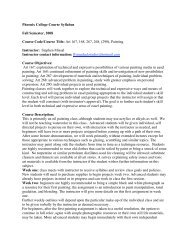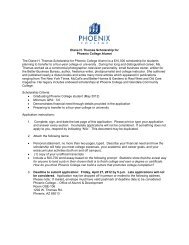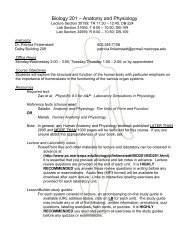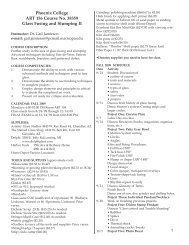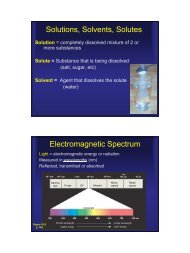Phoenix College Catalog 2009-10
Phoenix College Catalog 2009-10
Phoenix College Catalog 2009-10
Create successful ePaper yourself
Turn your PDF publications into a flip-book with our unique Google optimized e-Paper software.
<strong>Phoenix</strong> <strong>College</strong> <strong>2009</strong>–20<strong>10</strong> CATALOG | 77<br />
2.<br />
3.<br />
4.<br />
5.<br />
6.<br />
7.<br />
60 semester credit units in courses numbered <strong>10</strong>0 or above for<br />
the Associate in Arts degree, Associate in Science degree,<br />
Associate in Transfer Partnership degree, and Associate in<br />
General Studies degree; 60 semester credit units for the<br />
Associate in Applied Science degree; 62 semester credits for<br />
the Associate in Business degrees. For specific certificate<br />
programs, be credited with not fewer than the minimum total<br />
of credit units required for the certificate program.<br />
Students not continuously enrolled, as outlined in the <strong>Catalog</strong><br />
Under Which a Student Graduates policy, must satisfy current<br />
graduation requirements.<br />
have earned a minimum of 12 semester credit units toward the<br />
degree or certificate at the district college granting the degree<br />
or certificate. The 12 hours in the AAS degree curricula may be<br />
in the Required Courses area and/or Restricted Electives<br />
courses. Courses from the General Education Core and<br />
Distribution area are excluded. In cases where the certificate<br />
requires fewer than 12 credit units, a minimum of six credit<br />
units must be completed at the college awarding the<br />
certificate. The minimum of six credit hours in the certificate or<br />
degree curricula may be in the Required Courses area and/or<br />
the Restricted Electives. Courses from the General Education<br />
Core and Distribution areas are excluded;<br />
Shared Programs are programs offered at multiple colleges but<br />
not available at all colleges. The requirements are identical at<br />
all the colleges offering the program.<br />
A shared program requires a minimum of six credit hours from<br />
the total program requirements to be completed with a grade<br />
of “C” or better at the college awarding the certificate or<br />
degree. The exception is the Nursing program. For those<br />
shared programs with less than six credit hours, the total hours<br />
for the program must be completed at the college awarding<br />
the certificate.<br />
have filed an application for the degree or certificate with the<br />
Office of Admissions and Records on the date determined by<br />
the college/center.<br />
Students must apply for graduation from the college where<br />
they have successfully completed Block 4 of the Associate in<br />
Applied Science in Nursing.<br />
have a minimum cumulative grade point average of 2.000 at<br />
the college granting the degree.<br />
have a minimum cumulative grade point average of 2.000 in all<br />
courses used to fulfill degree requirements<br />
Some specific programs have higher grade requirements. It is<br />
the student's responsibility to be aware of these program<br />
requirements.<br />
have removed, thirty (30) days after the anticipated graduation<br />
date, all deficiencies on the record to use those courses<br />
toward program completion.<br />
have removed any indebtedness to any MCCCD college/center.<br />
8. have paid required degree or certificate application fee.See fee<br />
schedule (page 37) for charges. See Graduation with Honors<br />
(page 41) for information on honors designation.<br />
CERTIFICATES/DEGREES<br />
The Maricopa Community <strong>College</strong>s offer Certificates of Completion<br />
as well as Associate Degrees, one of which is conferred on each<br />
student who has completed a program of study. These certificates<br />
and degrees are as follows: (1) Certificate of Completion (Career<br />
Program Specified); (2) Academic Certificate; (3) General Education<br />
Certificate; (4) Associate in Arts; (5) Associate in Science; (6)<br />
Associate in Business; (7) Associate in General Studies; (8)<br />
Associate in Transfer Partnership; (9) Associate in Applied Science<br />
(Career Program Specified).<br />
All candidates for a degree and/or certificate must complete the<br />
General Graduation Requirements as approved by the MCCCD<br />
Governing Board.<br />
All students are urged to meet with a faculty advisor, program<br />
advisor or counselor as soon as possible to determine which<br />
program meets their needs and to plan their course of study.<br />
GRADUATE GUARANTEE POLICY<br />
The Governing Board believes so strongly in the quality of its<br />
colleges' occupational training programs that it guarantees graduate<br />
competence.<br />
1. Graduation from an Associate in Applied Science (AAS) is<br />
designed to prepare a person for entry-level employment in a<br />
specific career field. A graduate's ability to perform approved<br />
program competencies will be judged by employers. Should<br />
the employer of a graduate who has earned an AAS Degree<br />
find the employee lacking in the technical skills normally<br />
expected of an entry-level employee in the specific career field<br />
for which that graduate prepared, the District will provide the<br />
graduate with up to the equivalent of twelve (12) credit hours<br />
of retraining for no additional tuition.<br />
2. Because technical occupations change rapidly, initial<br />
employment in an AAS Degree-related field must occur within<br />
one year of graduation from the AAS Degree program in<br />
question.<br />
Retraining needs to occur as cost effectively as possible. The<br />
graduate's employer must present a list of the graduate's skill<br />
deficiencies to the appropriate vice president at the graduate's<br />
alma mater. All retraining will be completed in a reasonable<br />
time as agreed to by the employer, the student, and the<br />
college.<br />
LICENSURE DISCLAIMER<br />
Maricopa Community <strong>College</strong>s courses and programs prepare<br />
students for entry into a variety of professions. Many of these<br />
professions require that a person hold an occupational license or<br />
certificate in order to work in a particular field. Typically, a person<br />
must meet certain legal requirements before obtaining such a<br />
license or certificate. These requirements are established by<br />
county, state or federal agencies, and often are based on a person's<br />
character, or whether the person has been convicted of a criminal<br />
offense. It is possible for a student who has obtained a degree or<br />
certificate from a community college to be denied the right to work<br />
in a particular profession after completing the degree or certificate<br />
because of concerns over the student's character or criminal<br />
background. Any student preparing to enter a field for which a<br />
professional license or certificate is required is strongly advised to<br />
consult with the appropriate government agency that issues such<br />
credentials. That agency can provide the student complete<br />
information about any requirements the law imposes for working in<br />
a particular occupation.<br />
MCCCD General Education Statement<br />
The general education core of the program of study for an associate<br />
degree or a certificate helps students develop a greater<br />
understanding of themselves, of their relationship with others, and<br />
of the richly diverse world in which they live. The general education<br />
experience provides students with opportunities to explore broad<br />
areas of commonly held knowledge and prepares them to<br />
contribute to society through personal, social, and professional<br />
interactions with others. General education fosters students'<br />
personal development by opening them to new directions,<br />
perspectives, and processes.<br />
Through its general education requirements, the Maricopa County<br />
Community <strong>College</strong> District is committed to helping students<br />
develop qualities and skills that will serve them throughout their<br />
lives. General education opportunities encourage students to:<br />
• Build self-awareness, self-respect, and self-confidence<br />
MCCCD Degrees



